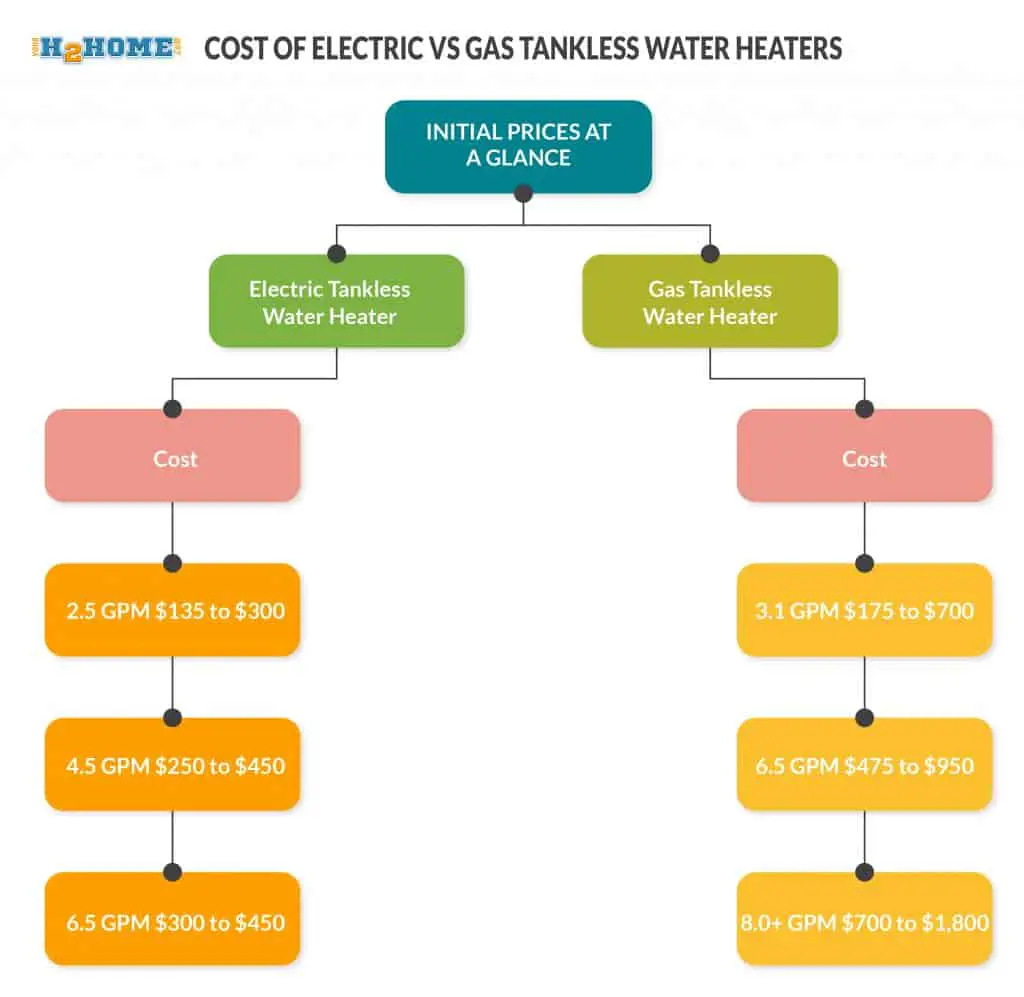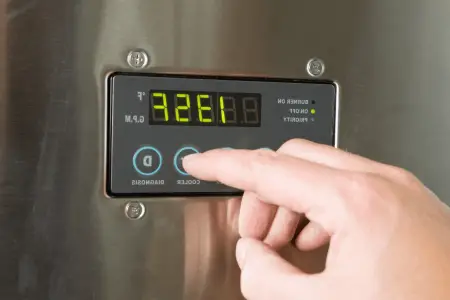The best commercial tankless water heater for you may not be the best for me. Our circumstances are likely very different.
For instance, if you have a restaurant and I have a warehouse then we are going to have vastly different needs.
Confusing, I know.
How are you supposed to know which one is going to do the job you need it to do? Since we have experience with different types and what they can do, we can help you understand for yourself which one is best.
Below we have a rough guide plus product reviews that will give you the information you need to be able to make an informed decision and take away any doubts that you have about whether one is going to be better than another when you need commercial endless hot water.
We have also prepared a detailed buying guide. It contains answers to the common questions people have about commercial tankless water heaters. So let’s get right to it!
In a Rush? Here’s our Top Picks for Commercial Tankless Water Heaters



Top 5 Best Commercial Tankless Water Heaters
When selecting a water heater for your restaurant or business, the most important thing is to pick the right size. We have therefore chosen only those heaters whose flow rate is at or greater than 6 GPM.
That’s because research suggests that a restaurant needs 6 gallons per minute of hot water on a daily basis.
Rinnai CU199IN, 11 GPM Natural Gas Tankless Water Heater
- Energy and Space Efficient Tankless Hot Water Heater: Our commercial hot...
- Optimal Water Pressure: This tankless water heater offers a...
- Smart, Reliable Heating: Rinnai Tankless Water Heaters feature Circ-Logic...
- Professional Installation Recommended: Visit the Find a Rinnai PRO page on...
- Guaranteed to Last: 8-, 5-, and 1-year commercial warranty for heat...
Type: Natural Gas
Thermal Efficiency: 97%
Flow Rate (GPM): 11 GPM
Temperature Range: 70F to 140F
Warranty: 10 years on heat exchanger, 5 years on parts, 1-year labor
The Rinnai CU199IN offers various excellent features. The first among which is its SCAQMD certification which makes it safe for indoor installation. This makes it more desirable than other natural gas models that must be installed outdoors due to fear of high emissions.
This heater also comes with a smartphone app to let you control its functionality from anywhere. You can turn it on/off, increase or decrease its water output and monitor its inner temperature right from your smartphone’s screen.
In terms of efficiency, the Rinnai CU199IN comes with Energy Star® certification. This means that this natural gas heater consumes 15% less power than its rivals on the market.
In terms of venting options, the Rinnai is flexible. Unlike the majority of natural gas heaters out there, it doesn’t force you to stick with the direct venting option. The CU199UN offers three additional venting options including concentric, non-direct and common vent.
Things We Like:
- Ultra-low emissions
- 11 GPM flow rate
- Energy Star certified
- SCAQMD approve
- 15% less power consumption than competitors
Things We Don’t Like:
- Price
Rinnai RL94eN Tankless Hot Water Heater
- Original Design: Tankless hot water heater's Circ-Logic technology offers...
- Never Run Out of Hot Water with this Compact Tankless Gas Water Heater:...
- Smart, Durable Design: Includes 12-, 5-, and 1-year residential guarantee...
- Professional Installation Recommended: Visit the Find a Rinnai PRO page on...
- Find Your Rinnai: See our product guides, manuals, energy guide, warranty...
Type: Natural Gas
Thermal Efficiency: 82%
Flow Rate (GPM): 9.4 GPM
BTU: 10,300 to 160,000
Warranty: 10 years on heat exchanger, 5 years on parts, 1-year labor
What is it that makes the Rinnai RL94eN different from the Rinnai CU199IN? Start with the flow rate. While this model is capable of churning out 9 gallons of hot water per minute, the CU199N, as noted above, has a maximum flow rate of 11 GPM.
Installation is another area where both these models differ. The CU199IN has been declared safe for indoor installation due to its ultra-low emissions. That isn’t the case with this model.
You can only install it outdoors as it isn’t approved for indoor installation.
That’s not where the differences end. While the CU199IN has received certifications from both Energy Star® and SQAMD, this one has only got the nod from the latter.
There is one area where this model fares better than the Rinnai CU199IN. It boasts Circ-Logic technology that gives you the freedom to set its water recirculation as per your habits. This allows you to receive hot water whenever you need it.
Things We Like:
- 9.4 GPM flow rate
- Wi-Fi capable operation
- easy to install
- 10-year heat exchanger warranty
Things We Don’t Like:
- Can’t be stored indoors
Rinnai RUCS75iP Tankless Water Heater
- Endless Hot Water: Our tankless hot water heaters let you enjoy unlimited...
- Energy and Space Efficient Tankless Gas Water Heater: This small hot water...
- Optimal Water Pressure: This tankless water heater offers a...
- Professional Installation Recommended: Visit the Find a Rinnai PRO page on...
- Guaranteed to Last: 12-, 5-, and 1-year residential factory warranty for...
Type: Propane
Thermal Efficiency: 82%
Flow Rate (GPM): 7.5 GPM
BTU: 10,300 to 160,000
Warranty: 15 years on heat exchanger, 5 years on parts, 1-year labor
The Rinnai Indoor Tankless Hot Water Heater is a great choice for people looking for a propane water heater.
Apart from offering a very solid flow rate of 7.5 GPM, it boasts a thermal efficiency of 93%. Throw into the mix this model’s 0.90 Energy Factor, and it will give save you significant money.
The Control-R 2.0 smartphone app, available in both Android and Apple devices, lets you set timers to ensure you have hot water whenever you need it. The app also features a ‘vacation’ mode which puts the heater to rest.
An added plus is that this heater is Energy Star® certified. Most propane water heaters aren’t and the fact that it is means you will enjoy huge savings on your annual heating bills.
And one of the best things about this heater? It has been declared safe for indoor installation and residential use.
Things We Like:
- Energy Star® certified
- Safe for indoor installation
- Up to 6 fixtures at once
- 15-year heat exchanger warranty
Things We Don’t Like:
- Extremely heavy
Rheem RTEX-24 Electric Tankless Water Heater
- ON/OFF Dial Control with adjustable digital temperature display
- Self-modulating power control
- 24kW Model Flow Rate: up to 5.9 GPM for RTEX-24
- Bottom 3/4" NPT water connections
- On demand, consistent and continuous hot water
Type: Electric
Thermal Efficiency: 99.8%
Flow Rate (GPM): 6 GPM
BTU: 80 to 140F
Warranty: 5 years on heating chamber, 1 year on parts
There are three things that you need to know about the Rheem RTEX-24 water heater.
The first is that it has a stylish design that helps it complement most interior designs. A shade of gray with a digital control panel and white knob will make this unit any room’s center of attention.
This unit’s compactness expands the number of locations you can install it. Some of the places we can think of include the wall of your restaurant’s kitchen, the space under its sink or on the backside of the door. That isn’t where the good news ends.
Its digital control panel lets you increase or decrease the temperature by one-degree increments. An internal self-modulating sensor adjusts this unit’s power consumption to exceed your hot water demands. Also there is a durable copper element that has been threaded to ensure easy replacement.
This model churns out a maximum of 6 gallons per minute of hot water. This allows it to serve up to three medium-size or up to six small size applications at once.
Things We Like:
- Digital temperature display
- Self-modulating power control
- 99.8% energy efficient
- Durable heating element
Things We Don’t Like:
- Price
Rinnai V65EN Tankless Water Heater
- Endless Hot Water: Our tankless hot water heaters let you enjoy unlimited...
- Energy and Space Efficient Tankless Gas Water Heater: This small hot water...
- Optimal Water Pressure: This tankless water heater offers a...
- Professional Installation Recommended: Visit the Find a Rinnai PRO page on...
- Guaranteed to Last: 10-, 5-, and 1-year residential factory warranty for...
Type: Natural Gas
Thermal Efficiency: 99.8%
Flow Rate (GPM): 6.3 GPM
BTU: 120,000 max
Warranty: 10 years heat exchanger, 5 years parts, 1-year labor
Most water heaters for restaurants cost a fortune. The Rinnai V65EN is certainly not one of them. Here is a model that has struck the perfect balance between incredible features and a budget asking price.
This model boasts a flow rate of 6 GPM. It is therefore capable of meeting the hot water needs of up to 6 appliances at a time.
You can also trust this unit to cut down the waiting time for hot water. It delivers instant hot water to the tap by keeping hot water in circulation at all times. This differentiates it from other water heaters that start heating water only when you open the tap.
It gives you manual and automatic options to turn on hot water circulation. The manual option requires you to press the push button in its panel. Activating the automatic option requires turning on this unit’s motion sensor, which will then automatically start hot water circulation on finding human presence.
Things We Like:
- Capable of Wi-Fi connectio
- Has an ultra-compact design
- Equipped with hot water recirculation technology
- Has an integrated Error Code indicator
Things We Don’t Like:
- Cannot install it indoors
What to Look for in a Commercial Tankless Water Heater
Now that you know our choices for best commercial water heaters, here’s what you must do to buy the best commercial tankless water heater for your individual needs.
Correct size
Buying to wrong-sized unit is the #1 complaint of people who buyer water heaters. I can not stress it enough: do you due diligence up front to buy a unit that will comfortably meet your anticipated needs.
– Your hot water requirements: Identify the applications that will require hot water and calculate each application’s individual flow rate. Add the flow rates you have just calculated. This will give you a rough estimate of your daily hot water needs.
– Your heating requirements: Use this map to calculate the temperature of groundwater in your area. Then ask yourself at what temperature you’d like the heater to supply hot water. Subtract the former from the latter. This is the temperature the heater must raise.
Have both these measurements at the ready? Then put them in this calculator to determine the size of your ideal tankless water heater. Sizing a water heater is super important, so make sure you get this step right.
Energy Star® certification
Commercial gas-fired tankless water heaters with the Energy Star logo consume 15% less power than their standard counterparts. They also waste less energy and are cheaper to operate. All in all, they’re incredibly energy efficient.
Electric tankless water heaters are similar.
Those that are Energy Star certified consume 50% less electricity than conventional electric heaters. That’s because such units don’t only rely on the supplied electricity to raise the water temperature. They also use ambient heat for the same purpose.
Correct Drain Valve
Selecting the correct drain valve is crucial for your water heater’s performance. Mainly because constant draining is required to prevent sediments from building up in the pipes. But also because regular flushing helps water heaters last longer by improving the quality of heated water.
You can get your hands on a plastic or a brass drain valve. Plastic drain valves cost the least but break down much quickly, requiring frequent replacement. Those that are made of brass, however, can keep going for years while handling daily flow rates of up to 200 gallons.
Higher Energy Factor
Energy factor describes the tankless water heater’s energy efficiency. Manufacturers calculate it by dividing the energy a heater uses with the energy that powers it. The former is always smaller than the latter, but not by much in the best commercial tankless water heaters.
You can verify this by checking out the Energy Factor of the models reviewed below. Other commercial tankless water heaters that you see on the market have their efficiency between 50 and 90%.
The best commercial electric water heaters, on the contrary, touch the 99% efficiency mark.
Tip: Electric-powered tankless water heaters have a higher energy factor (up to 0.99) than their gas-powered counterparts (between 0.6 and 0.9). However, since natural gas costs three times less than electricity in the US, you shouldn’t view the energy factor in isolation. Compare the energy factor with the fuel cost when deciding in favor of electric or gas water heaters.
Condensing and Recirculation
Tankless water heaters with the condensing function are incredibly energy efficient. They have a system of pipes designed to capture the heat from their exhaust and supply it back to the pipes. This allows these units to use two energy sources – fresh heat and spent heat – to raise water’s temperature.
It’s similar with units that have a recirculation system. This system senses the presence of cold water in a hot-water line, before sending the cold water back to the tankless water heater through a dedicated line.
This allows them to deliver hot water non-stop.
Electric vs Gas Tankless Water Heater
Depending on your situation, you may decide to go with an electric or gas version. Here’s how electric and gas units compare:
Capital and running costs
Electric tankless water heaters cost less up front than gas heaters to run. While heavy-duty gas-powered models cost as much as $1000, you can get your hands on an equally powerful electric model for $500.
However, gas-powered models cost less to run. At the time of writing this article, one unit of electricity costs three times more than one unit of natural gas.
Ease of installation
Every plumber worth their salt will tell you that electric tankless heaters are a cinch to install. All you have to do to get them up and running is hook their inlet to your home’s water supply, their output to appliances requiring hot water and their switch to a power outlet.
Hence the reason why some people choose to install electric heaters on their own. But you should probably leave the task of installing a gas tankless water heater to a veteran plumber.
These units require a dedicated ventilation line, a fresh air supply and a gas line to be ready to use.
Hot water supply
Electric tankless water heaters fare worse in this regard. They have bottlenecks in their design that prevent them from heating (and supplying) more than 10 gallons of hot water per minute.
This is the reason why almost all big restaurants use gas-powered heaters.
Depending on the supply of natural gas, these units can safely churn out up to 20 gallons of hot water per minute. Provided your water lines don’t have any leakage, the water supply will be enough to meet the requirements of up to 5 middle-sized appliances.
User safety
It goes without saying that electric models are much safer. You can install them in closets, on the walls of your restaurant’s kitchen or inside the kitchen cabinets without worrying about things like gas leakages, pipe bursts, etc.
This is a particular benefit for closed spaced environments.
That isn’t the case with gas-powered commercial tankless water heaters which you shouldn’t install indoors. Especially if you don’t want to take chances with your safety and those of others in your commercial establishment by discounting the threat of gas leakage.
Maintenance
Electric tankless water heaters are easier to maintain. You only have to flush them once every six months to prevent the build-up of lime and other dust particles in their pipes.
Aside from that, you have to clean their water inlet screen filter once every month. Both of these are things you can do on your own.
Gas tankless water heaters do not offer this luxury. Those installed on commercial premises must be inspected annually by a licensed technician to ensure that they’re working as intended. They also need more frequent flushing, as they are more susceptible to mineral build-up.
Final Verdict : Electric or Gas Tankless Water Heater?
A lot of business owners wonder if an electric or gas water heater is better. That’s a hard question to answer.
You might want to go for electric tankless water heaters if you want something that is easy to install, requires less maintenance and lasts longer. Your up front costs will also be lower.
However, if your daily hot water demands are especially high, then you might want to consider a gas water heater. Over time, you will save money.

Conclusion
We hope this buying guide has helped you understand what to look for in a commercial water heater. Remember to always research your local tankless water heater code requirements, and to size your unit correctly.
When in doubt, buy a unit that offers at least 10 GPM.




I graduated with a degree in Chemical Engineering and have written for a number of nationally recognized publications in the home improvement space. My skills include fluid mechanics and process engineering and I have worked on numerous projects, including in waste water flow rate calculation and heat balance of steam rollers in the paper industry. My goal as a technical writer is to make complicated topics easy to understand for the average person.



